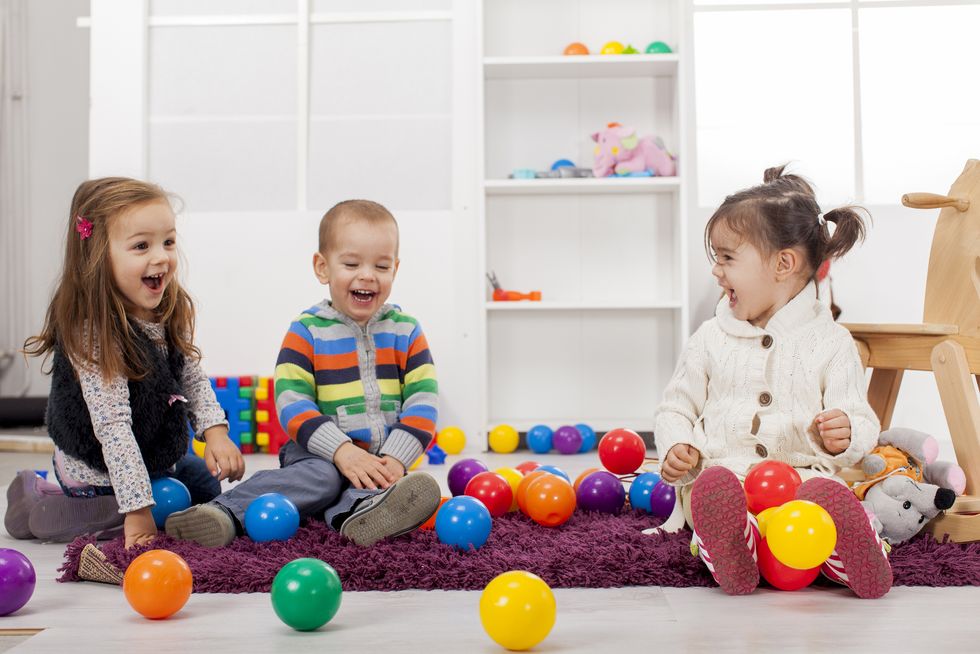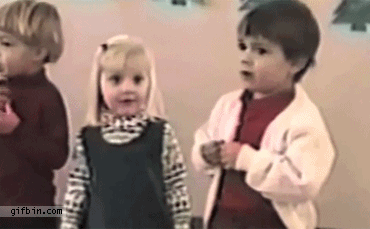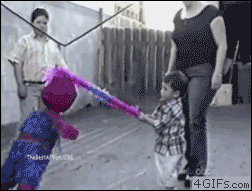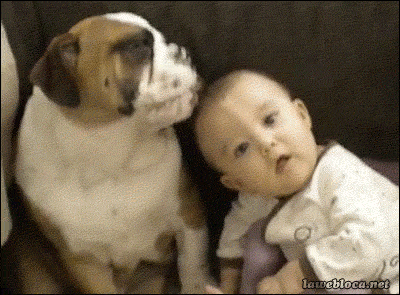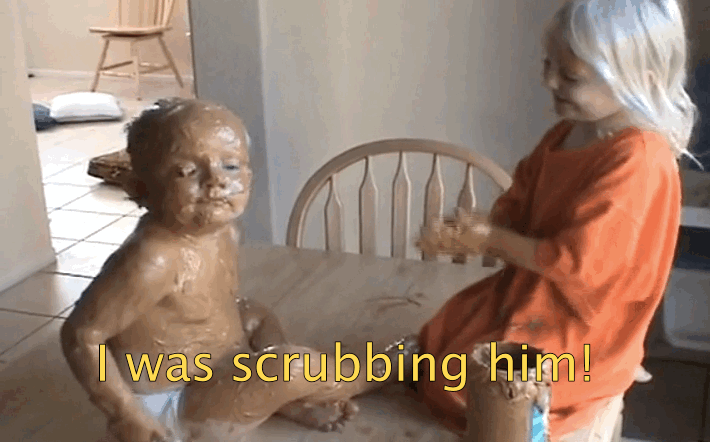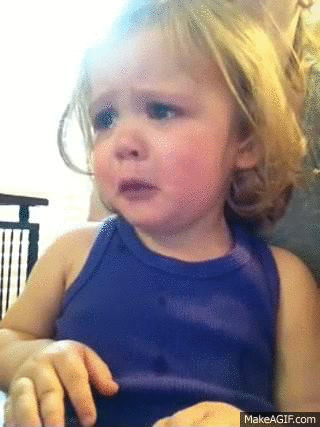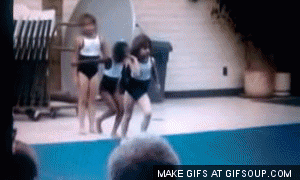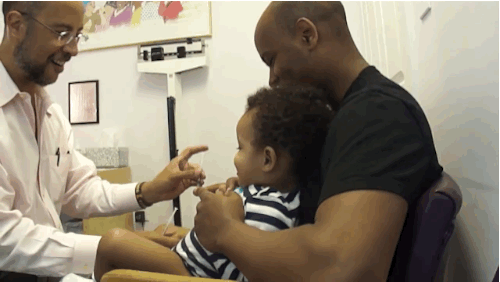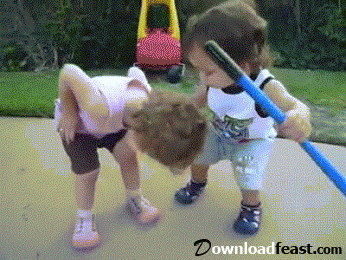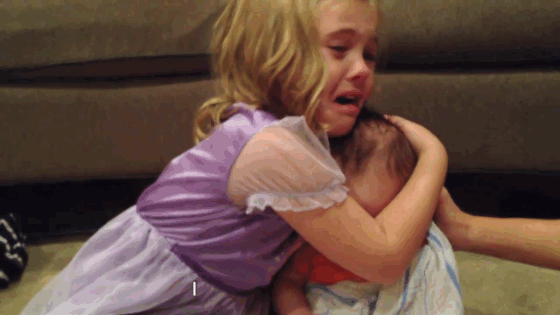Spending a day in a daycare is not as easy as some people would think. You don't just sit there and play with kids all day; you cook, clean, help diffuse situations, and act as a shoulder to cry on. When working in a daycare you learn the basics, such as changing a diaper, dealing with vomit, and figuring out a way to remember a bunch of names. In addition to the basics that I will use to take care of my future children, I also learned many life lessons.
Here are 20 life lessons I learned from children who are a third of my age:
1. It’s okay to miss your loved ones.
Whether it has been five months, five days, or five minutes, it's okay to express that you miss your loved ones. A lot of times during the day kids will start to cry because they want to see their mommy or daddy. From their tears, I have learned that it is important to accept your feelings even when they seem irrational.
2. Food really can change your mood.
Being hangry is a very real thing. Crankiness can magically disappear after a good meal of chicken nuggets or mac n cheese. Even the moodiest kids are happy for a while after snack time. Food can change your mood and rejuvenate you, so don't forget to grab a snack.
3. We shouldn’t be embarrassed by bodily functions.
As unflattering as it may be, burps, farts, sneezes, and all other natural functions of the body should not be something embarrassing. Everyone does these things, so why do we hide them? If you hear a burp or fart in a daycare, it is usually followed by a giggle and the proud announcement of “That was me!” I’m not saying that this is what adults should do, but we should not be mortified if we accidentally let a bodily function out at an inopportune time.
4. Saying sorry can go a long way.
While things are often more complicated as adults, the beginning to every apology should be a sincere one. Kids over-apologize or do things on purpose, then say sorry, but from that, I have learned that when sincere, an apology is a powerful thing. At the daycare, the kids are quick to forgive too, and that is another lesson on its own.
5. A lot of things are temporary.
Many things in this world are temporary, especially feelings. As an adult, I have gone through a decent amount of difficult things that I thought would never end, and I have dealt with many emotions that felt everlasting. Working with children has taught me that negative emotions will pass, friendships can end at the drop of a hat, and food (whether you realize it or not) disappears very quickly from your plate.
6. Appreciate the little things in life.
There is nothing more adorable than the smiles on kids’ faces and sparkles in their eyes when they see something that they love. The pure bliss when seeing bubbles, playing with their favorite toy, or when I give them Play-Doh is inspiring. It makes you realize that the seemingly unimportant things in life really do have an impact, and you should appreciate them.
7. Remind people that they are important to you.
One of the most rewarding things about working in a daycare is the fact that every time I start a shift, kids run up to me, hug my legs, and say things like “I missed you!” or “Yay, you’re here again!” The happiness that those words give me is a feeling that everyone deserves to feel. Take this lesson from the toddlers and remind those you love that you care about them.
8. Love is unconditional.
When people think of babies and toddlers, they often think of smelly diapers, drool, and messy eating, but the unconditional love they have is often overlooked. Babies trust will all they have because their lives are (literally) in your hands. They put love and trust in you, oftentimes more than you think you deserve. One baby at the daycare even held himself up against a child’s gate so he could stand there and look in the kitchen while I took a break to eat my lunch; he stayed there the whole half-hour just smiling and laughing. A child’s heart is never full, and that is something we can take a lesson from.
9. Looking innocent can sometimes make you look more guilty.
Sometimes it is the cute little girl with rosy cheeks and perky pigtails that slapped the older boy. If you hear crying and look around the room, a lot of the time the one who hit or stole the other kid’s toy is the one who looks the most innocent. Children have perfected the “It wasn’t me” look, so it is important to be able to get past that.
10. Step out of your comfort zone.
Whether it is trying new foods or going down a tall and scary slide, you should go for it. Children are the most adventurous people. While they may not like all of the things they try (and make a big deal about making sure they never try it again), at least they do it once, and we should too.
11. It doesn’t matter how silly you look if you’re having fun.
From the carefree attitudes of the kids, I have learned that you should not be embarrassed for acting a little goofy. I have broken out of my shell as a result of these kids in two months than I did all throughout high school. Some of the other "teachers" there don’t interact with the kids as much, but I have learned not to care what they think as long as I am doing my job (and I have fun while doing it). There is always time for a dance party no matter who is watching.
12. “Use your words” to solve a problem.
One of my most said phrases while at work is “use your words.” When kids are mad they like to cry or just scream at the top of their lungs. When I got over to calm them down I explain to them that in order to effectively solve a problem you need to say why you are upset. Reminding them of this reinforces in my mind that the silent treatment is not the best solution and neither is lashing out. A calm conversation is a better conflict solver than any other option. This resolution may be hard to do sometimes, but it allows everyone to say how they feel (and sometimes will even end in a hug).
13. Tell someone if they hurt your feelings.
People are not mind-readers, so if you don’t ~politely~ let them know that they did something wrong, they may be completely unaware that there even is any conflict. One day during snack time, this little boy pushed his friend’s Cheez-Its off the table. I went over to him and said “That wasn’t very nice. Why did you do that? He is not going to want to hang out with you if you are mean to him like that.” The boy responded by crying and saying “(inaudible) hurt my feelings!” I asked “Who did?” and he blatantly replied “YOU.” At that point I realized that sometimes we are unaware of how we make other feel, and something that seems minuscule to us may mean the world to someone else. The incident reminded me to think about how others feel, and let others know if they did something to hurt you.
14. Don’t be embarrassed to ask for help.
If you cannot do something on your own, don’t just sit there and wait until someone offers to help. You also should not be ashamed to admit that you are unable to do something. Kids ask for help with the most basic things: Sometimes you need to encourage them to do it on their own, but when they truly are having trouble, you need to hold out a helping hand. This simple lesson is easily forgotten in everyday life.
15. Dream big.
Make it a point to work your imagination everyday. It sounds cheesy, but if you dream it, you can do it. Keep your mind open and you never know what you’ll achieve. One kid told me he wanted to be a doctor, a lawyer, and either Iron Man or Captain America (he hasn’t decided yet) when he grows up. Other kids color pictures with purple grass and a blue sun. Imagination can take us many wild places, so dreaming big is key.
16. Sometimes you just need to be distracted.
If a kid is mad that someone else is playing with the toy they wanted, you have to present a toy that may be more appealing to them. It immediately takes their mind off of their distress. We need to practice doing the same. When going through a tough time in life, you just need to get your mind off the situation for a while sometimes.
17. Ask questions when you’re curious.
Kids have no shame in asking whatever bizarre question pops into their mind. As adults we need to have more of a filter, but if you are curious about something, ask. We always say that knowledge is power, so why do we fear embarrassment when asking a question?
18. Things don’t have to make sense.
Kids make statements all the time, and often I have no idea what they are talking about. From this I learned that if it makes sense to you, but not others, it is still a valid thought. Some questions are not meant to be answered, so leaving your imagination to wonder is sometimes more blissful and innocent. Things don’t always have to make sense, but we have to accept that.
19. Human contact is important.
This is basic kid philosophy: Love your friend? Hug them when you see them, before they leave, and any time in between. Got a boo-boo? It needs kissed better. Did a good job? High-five time. Whatever happens, it needs to be reinforced with human contact. As adults, we tend to shy away from this, but in reality a hug or a high-five really can make someone feel special, appreciated, and important.
20. Parents/guardians and siblings are the most protective people.
There are a lot of siblings in the daycare I work at. There are two families where one child is in the baby room and the other in the toddler room. When we walk the babies past the room their brothers are in, we have to stop in and say hi. The babies laugh and reach away from me towards their siblings, and the siblings get big toothy grins on their faces. Also, parents will do whatever they can to protect their child. Nothing will ever get between that.

